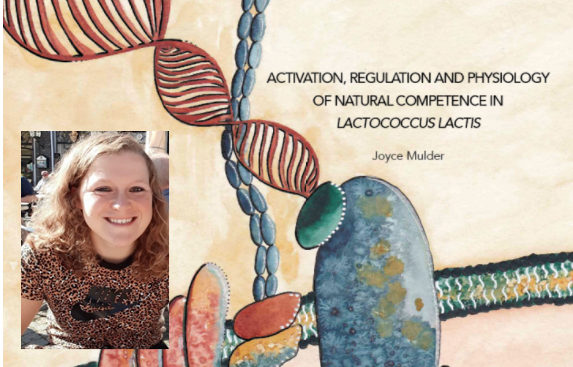Joyce Mulder defends her PhD thesis ‘Activation, Regulation and Physiology of Natural Competence in Lactococcus lactis’



This PhD study explores whether natural mechanisms in bacteria can be used to naturally improve bacterial strains that are being used for food fermentation by, for instance, introducing beneficial traits to grow in milk. Joyce worked primarily on Lactococcus lactis in the field of horizontal gene transfer where she explored and assessed whether L. lactis can develop natural competence, a mechanism that can be used to introduce novel traits into lactococcal strains.
Activation of natural competence was accomplished by using the NICE system1, a system developed by NIZO, for controlled overexpression of the master regulator of competence ComX. In this study, it was observed that intermediate induction of the master regulator of competence (ComX) by using the NICE system led to transformation of L. lactis. In contrast, high levels of ComX led to a stringent response in which cells were in a viable but not culturable state, so in stress, though in which no transformation could be detected.
The tool that Joyce developed to induce natural competence can also be used for cloning purposes including the integration of DNA into the genome and is way more efficient compared to the traditional cloning techniques. This means that, in theory, you can create a mutant in L. lactis within a day which saves a lot of time and material.
Within this study a lot of in-depth research has been performed as well, including transcriptomics of the competence state, expression of competence promotors via fluorescent reporters, viability assays, and high throughput screenings. Further research is needed to apply natural competence in the food industry.
NIZO developed the NICE system for overexpression of proteins in the food-grade bacterium Lactococcus lactis. This system allows for tightly controlled expression of proteins using the food-grade inducer peptide nisin. This system can be used as a safe platform for expression of proteins that have a potential to be used as biotherapeutics.